General
Ugandan Scientists share Climate Change mitigation strategies at AR5 close
Published
12 years agoon
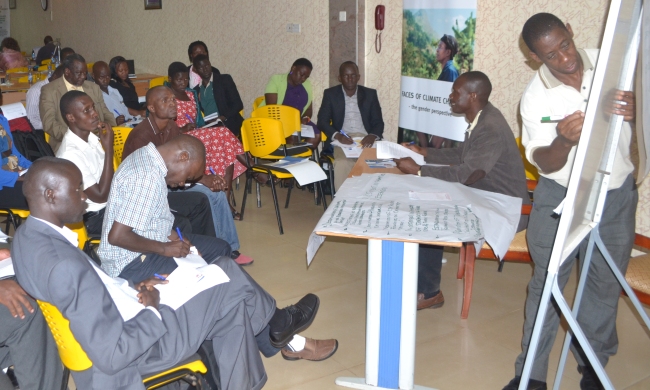
Scientists have presented some of the ways Uganda has responded to the Intergovernmental Panel on Climate Change (IPCC) findings. This was during the two day IPCC Fifth Assessment Report, (AR5) outreach event organized by Climate and Development Knowledge Network (CDKN) and College of Agricultural and Environmental Sciences (CAES), Makerere University in conjunction with the Ministry of Water and Environment (MWE). The outreach event was aimed at disseminating the findings of the Report to policymakers, the private sector, researchers and civil society organizations in Uganda.
Convening at Hotel Africana for the day-two plenary sessions and closing ceremony on 22nd August 2014, the stakeholders highlighted the need for the developing countries to improve their awareness and understanding of climate-related risks and implications to their work.
The first session chair for day two, Mr. Paul Isabirye, Coordinator, Department of Climate Change and The United Nations Framework Convention on Climate Change (UNFCCC) Focal Point for Uganda said that Uganda was already experiencing the effects of climate change. He added these effects have led to;
- Increased land degradation due to increased extreme weather events such as droughts and floods, aggravated by poor land-use practices.
- Crop failure or significantly reduced crop production in some years due to increased drought incidences associated with increased climate variability and change.
- Increased hunger and famine due to reduced agricultural productivity.
- Increased pest infestations and other weather related plant pathogens.
- Higher order impacts like increased costs of production, lower profitability, a decrease in food security and therefore a need for more food imports.
Mr Isabirye however remarked that the Government of Uganda has instituted several strategies and institutions to prioritise climate change such as upgrading the Climate Change Unit to a Department of Climate Change and the Department of Meteorology to the Uganda National Meteorology Authority (UNMA).
During the session on policy and practice, scientists from the from Office of the Prime Minister, National Agriculture Resilience Initiative-Ministry of Agriculture, Animal Industry and Fisheries (MAAIF), the National Agricultural Research Organization (NARO), Department of Climate Change (DCC)-MWE, the Makerere University Centre for Climate Change Research and Innovations (MUCCRI) and representatives from the private sector discussed several ways in which Uganda is responding to the findings of the IPCC.
Presenting on behalf of the Private Sector, Ms. Sarah Kibenge from the Private Sector Foundation Uganda (PSFU) remarked that due to the impact of climate change, labor productivity has reduced due to higher incidences of vector-borne diseases, resulting into declining profit margins. Ms. Kibenge said that, several human actions in industrialization, construction and in agriculture are seen as causes and contributors to climate change.
“However we must be keen about Environmental protection. Ugandans has been involved in planting and afforestation activities, environment impact assessment technology, waste management through recycling, packaging using environmentally-friendly materials,” she added.
In her presentation on Disaster Risk Management (DRM) in Uganda, Ms. Jacqueline Kagoda a Disaster Management Officer-OPM, stressed the need for Uganda to create an effective framework through which disaster preparedness and management is entrenched in all aspects of the development processes,
“As the central Coordinating Ministry on Disaster, the Office of the Prime Minister has set guiding principles like, using a multi-sectoral approach, community participation in DRM, public awareness, use of adequate expertise and technology, vulnerability analysis, observation of human rights, and consideration of climate change upon which implementation is premised,” Ms.Kagoda stressed.
“The Ministry has provided Early Warning Systems especially for floods together with UNMA & DCC for a survey is being done in Butaleja District. The National Emergency Coordination and Operations Centre (NECOC) is being equipped with the DRM comprehensive hardware and software such as Arc GIS, Modelling softwares on climate related risks such as floods, Country Programming Paper to end Drought Resilience in partnership with MAAIF is underway, and International DRR and Peace Day Celebrations are being planned” she added.
Talking about National Agriculture Resilience Initiative, Mr. Stephen Muwaya said that the Ministry of Agriculture, Animal Industry and Fisheries MAAIF has adopted a Climate Change Policy and Action Plan,
“The Ministry through this policy and action plan has also promoted and encouraged highly adaptive and productive livestock breeds, conservation agriculture and ecologically compatible cropping systems to increase resilience to the impacts of climate change, Promote sustainable management of rangelands and pastures through integrated rangeland management,” Mr.Muwaya remarked
Dr. Evelyn Komutunga, an Agro-meteorologist at National Agricultural Research Organization (NARO), Kampala Uganda said the organisation had developed strong drought and heat tolerant crop varieties, generating technology for short duration crops, technology for assorted vegetables under horticulture research system, developing a laboratory research institute, carrying out sustainable land management and restoration of degraded land.
“On Climate change adaptation and mitigation, NARO has managed to focus on data management through Crop yield monitoring and projections, and crop suitability mapping information packaging and dissemination (cropping calendars). NARO has also carried out conservation of at least 700 new accessions of 20 core collections and enhanced management for sustainable utilization of selected Plant Genetic Resource, biotechnology systems, diagnostics and processes developed for improved productivity of selected crops,” Dr. Komutunga explained.
In her presentation, the National Programme Coordinator, Africa Climate Change Resilience Alliance (ACCRA), Ms. Margaret Barihaihi, said ACCRA had facilitated Government policymakers to share community-based Climate Change Adaptations/Disaster Risk Reduction (CCA/DRR) implementation lessons at strategic national, regional and international climate change debates.
“The institution has been involved in policy formulation and contributed substantially to the National Climate Change policy 2012, ACCRA has collaborated with the Ministry of Water and Environment in raising awareness and mainstreaming Climatic Change adaptation into Local Government development plans,” she remarked.
Ms. Barihaihi said ACCRA has also collaborated with the Uganda National Meteorological Authority (UNMA) in strengthening seasonal weather forecast and climatic information for local planning.
According to Mr. Chebet Maikut, a representative from the Department of Climate Change (DCC)-MWE, the Government of Uganda has revised some common policy priorities to promote, research and development, transfer and diffusion of technology through the use of appropriate information sharing incentive schemes and support mechanisms as relevant to various sectors concerned.
“The Government of Uganda has also focused on mainstreaming gender to reduce the vulnerability of women and children, supported education, awareness raising and capacity development for a range of stakeholders (government, academics, civil society and private sector) contributing to the National Development Process right from the community level to the national level,” Mr. Maikut said.
On the academic front, Mr. Mfitumukiza David a climate adaptation specialist said the University has set up the Makerere University Centre for Climate Change Research and Innovations (MUCCRI), at the College of Agricultural and Environmental Sciences (CAES).
“Launched in 2013, MUCCRI is motivated by the need to strengthen climate change research, innovations and information dissemination and to also strengthen East African Resilience and Climate Change Adaptation Capacity through Training, Research and Policy Interventions. MUCCRI is structured to work in four thematic areas; Climate Science, Mitigation, Adaptation, Policy, Training and Outreach,” Mr Mfitumukiza said.
During the group discussions focusing on Uganda’s response to the IPCC’s findings, participants were divided into groups and tasked to develop ideas on the opportunities for Uganda to respond to the IPCC findings, through the work of different sectors in managing climate change.
Chaired by Prof. John Baptist Kaddu, Makerere University, the four groups on; Agriculture, Water, Energy and Infrastructure developed recommendations on policy, research and practices that Uganda should adopt, which findings were later shared in a plenary session.
Giving the closing remarks, Mr. Paul Mafabi, Director for Environmental Affairs, MWE said the goals of the outreach program have already been achieved in the two days the gathering was in Uganda, through knowledge and information sharing on the constructive topics.
“I am very confident that all participants are now more informed on these issues. Therefore I do hope that the participants will utilize the knowledge gained here in their duties and also carry it forward to others who were not able to participate in this important event. You have all been given a leadership role in the climate change arena and you are therefore expected to act responsibly to avert the impacts of climate change in good time,” Mr. Mafabi said.
Mr. Mafabi emphasized Uganda’s commitment to keep climate change high on the development agenda through empowering the population with any evolving information to guide in planning and public investments.
Please see Downloads for all presentations from IPCC AR5, Kampala Uganda
Article by Nabatte Prossy, Intern, Public Relations Office
You may like
General
Makerere Explores Strategic Industry Partnership with Psalms Food Industries to Strengthen Manufacturing Innovation
Published
6 hours agoon
March 4, 2026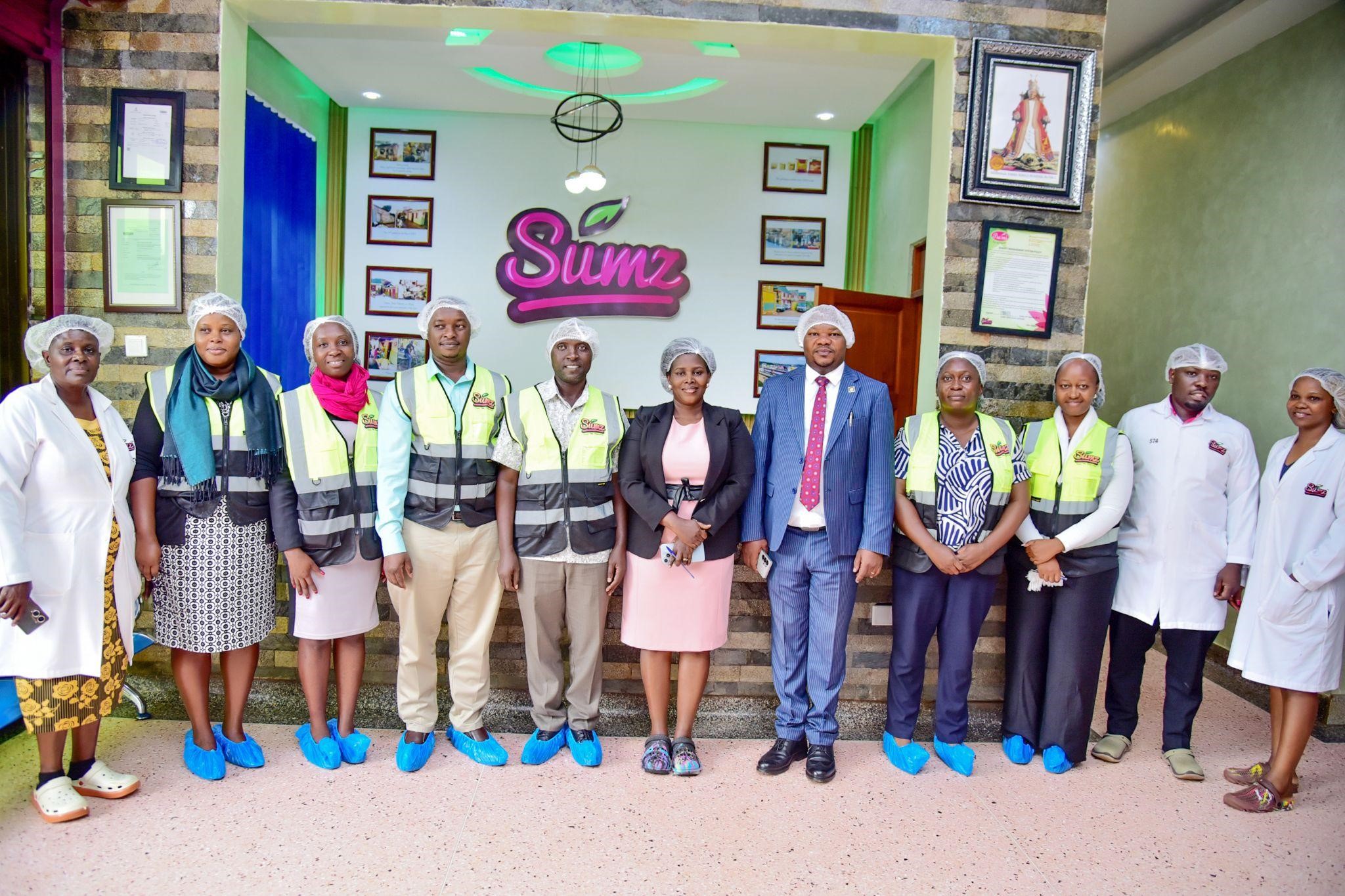
On 2nd March, 2026, representatives from the Advancement Office, the College of Business and Management Sciences and the University Innovation Pod visited Psalms Food Industries to discuss a prospective partnership aimed at strengthening university–industry collaboration in manufacturing, research, innovation, and skills development.
Psalms Food Industries, a homegrown snacks innovation and manufacturing company, operates three major brands, namely, Sumz, Afrikan Harvest and Krunchables, which have grown to a range of 37 products and target the introduction of five new products annually. The company distributes products across Kenya, Rwanda, the Democratic Republic of Congo, South Sudan, and, recently, Tanzania. As a labour of love, the idea of producing snacks was born during the honeymoon of Mr and Mrs Ngabirano, who now run Psalms Food Industries side by side.
Dr. Denis Ngabirano, CEO and Co-Founder of Psalms Food Industries, during the meeting, described the company as “a snacks innovation house, with all our products developed in-house.” He noted.
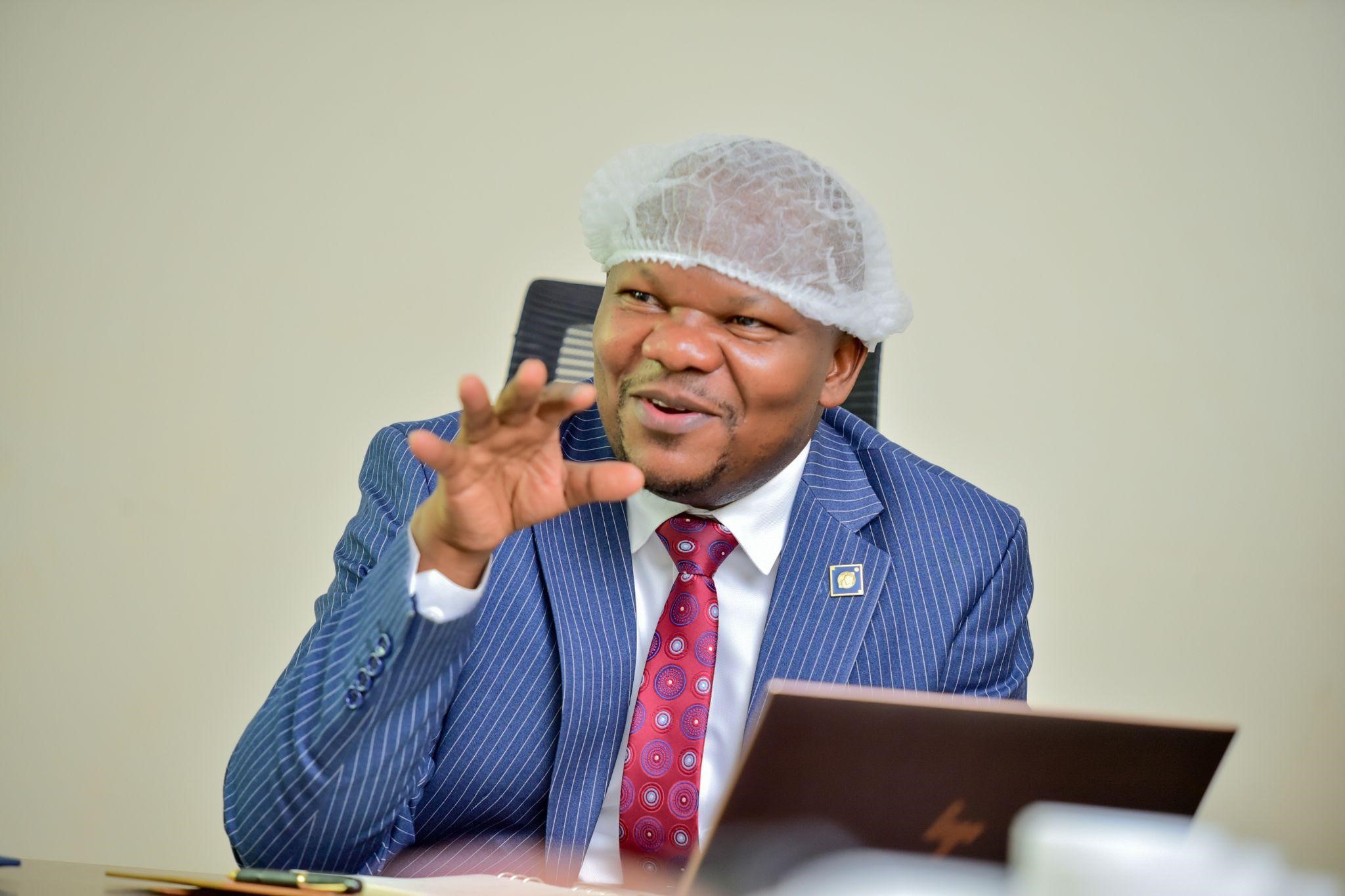
He emphasised the company’s commitment to quality assurance and consumer-centred research, noting that Psalms conducts surveys and gathers customer feedback to inform product development, supported by an internal microbiology and chemistry laboratory.
Dr. Denis Ngabirano noted that the company had only recently introduced two brands, “Afrikan Harvest for it’s health conscious clientele and Kruchables for it’s volume centric clientele.
“Afrikan Harvest has no additives, it is a brand for health-focused consumers,” he explained, while highlighting the differentiated positioning of their product lines. “Sumz is our premium brand, and Krunchables focuses on volume.”
Student-Centered Experiential Learning
A key focus of the meeting was structured experiential learning for students across disciplines. Potential areas of collaboration include internships, graduate trainee pathways, and hands-on exposure within Psalms’ incubation and production facilities.
The proposed engagement spans multiple fields, including environmental sciences, engineering, procurement and logistics, finance and accounting, quality control, production and manufacturing, human resource management, marketing, and international business.
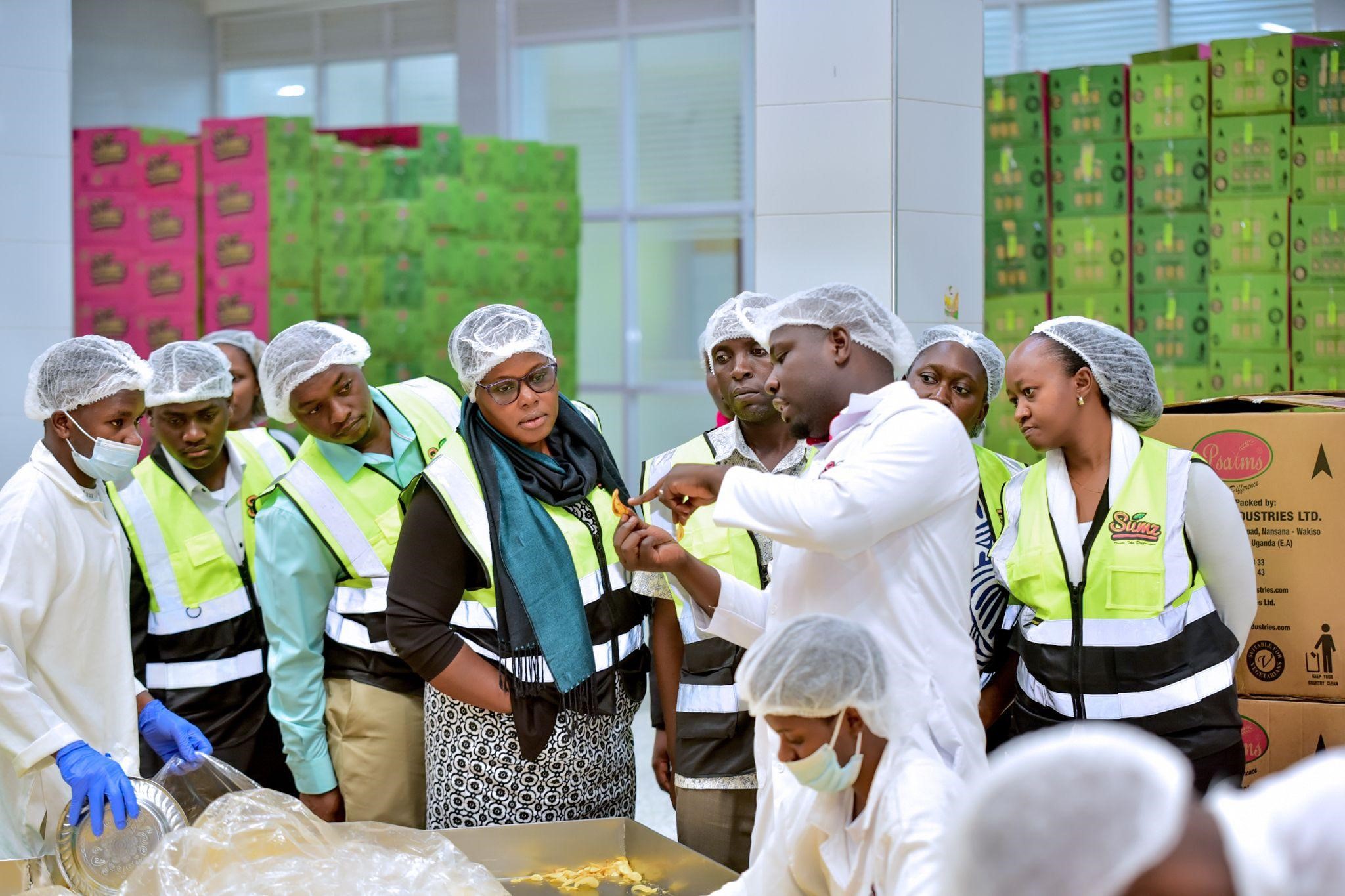
The partnership could provide students with direct exposure to real-time production systems, standard operating procedures (SOPs), and quality assurance frameworks, strengthening the practical relevance of their academic training.
Among the innovative ideas discussed was a potential competition involving students from the Fine Art and Industrial Design disciplines to redesign packaging for selected Sumz products. The proposal would allow top designs to be commercially adopted, creating a direct bridge between creativity, intellectual property development, and industrial application.
Research, Innovation and Commercialisation
Both institutions expressed interest in joint applied research initiatives, particularly in process optimisation, data analytics for manufacturing efficiency, product improvement, and sustainable production systems.
Opportunities were also discussed around collaborative research in machine design, crop development for snack processing, and factory energy solutions, areas that not only benefit Psalms but have broader implications for Uganda’s manufacturing sector.
The engagement further highlighted potential linkages with the University’s innovation and commercialisation structures, including the University Innovation Pod (UNIPOD), to support co-creation and scaling of student-led innovations.
Mr Awel Uwihanganye, Chief Advancement Officer at Makerere University, proposed strengthening the engagement through structured programming, including a planned collaboration between the University’s innovation Hub and the upcoming incubation Hub at Psalms Food Industries, particularly to support the commercialisation of research outcomes for both students and staff.
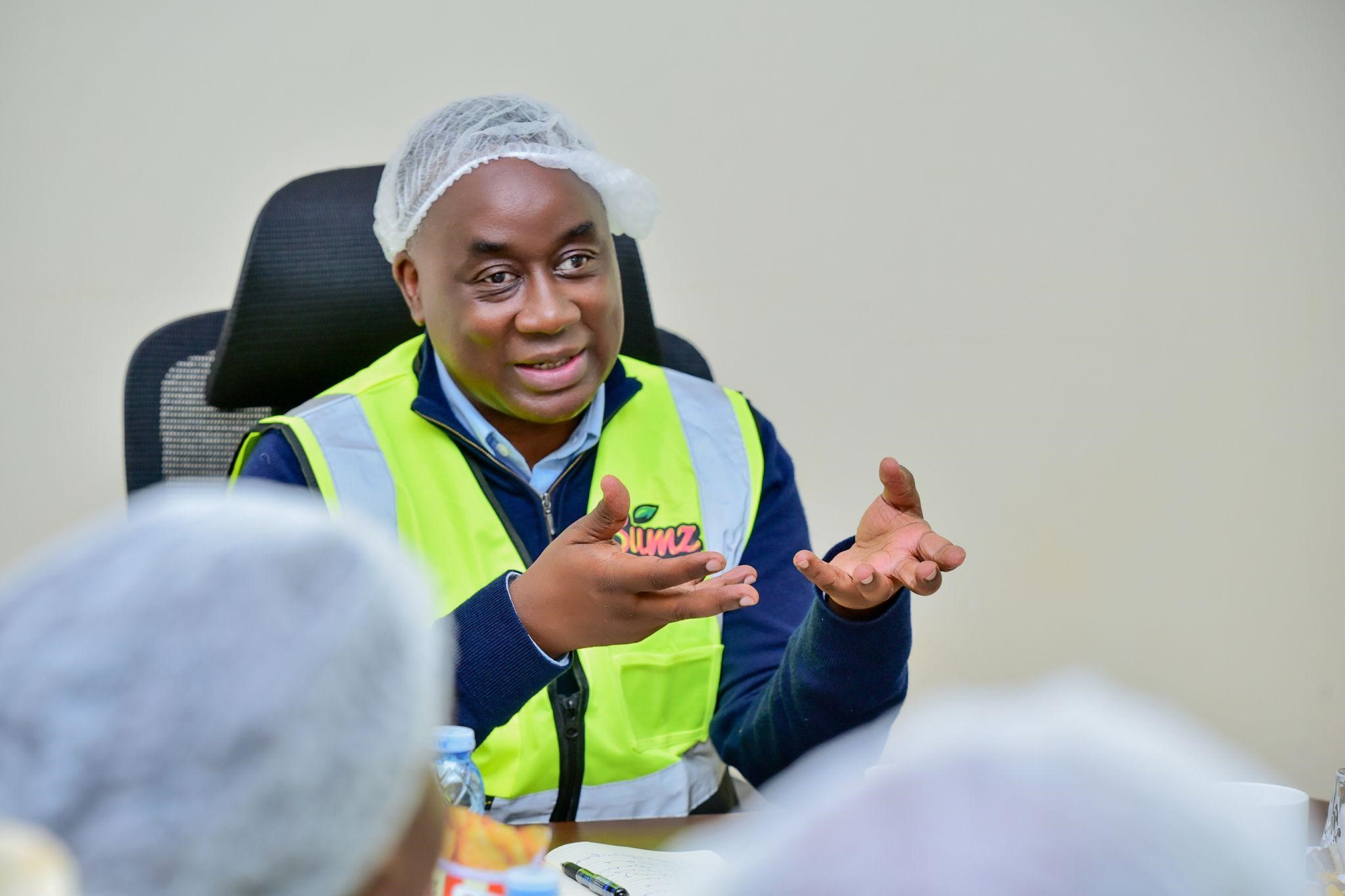
Curriculum Co-Creation and Staff Exchange
Beyond student placements, discussions also focused on co-developing academic content that responds more directly to industry needs, particularly within the manufacturing value chain.
Proposals included guest lectures by industry practitioners, staff exchange programmes to expose academic staff to factory operations, and tailored short courses for Psalms staff based on identified skills gaps.
Dr. Jude Mugarura, Head of the Department of Marketing and Management at COBAMS, emphasised the importance of embedding the partnership within academic programming. He proposed “internships for students in HR, marketing, international business, accounting and finance,” as well as staff exchanges to give University staff hands-on exposure to manufacturing operations.
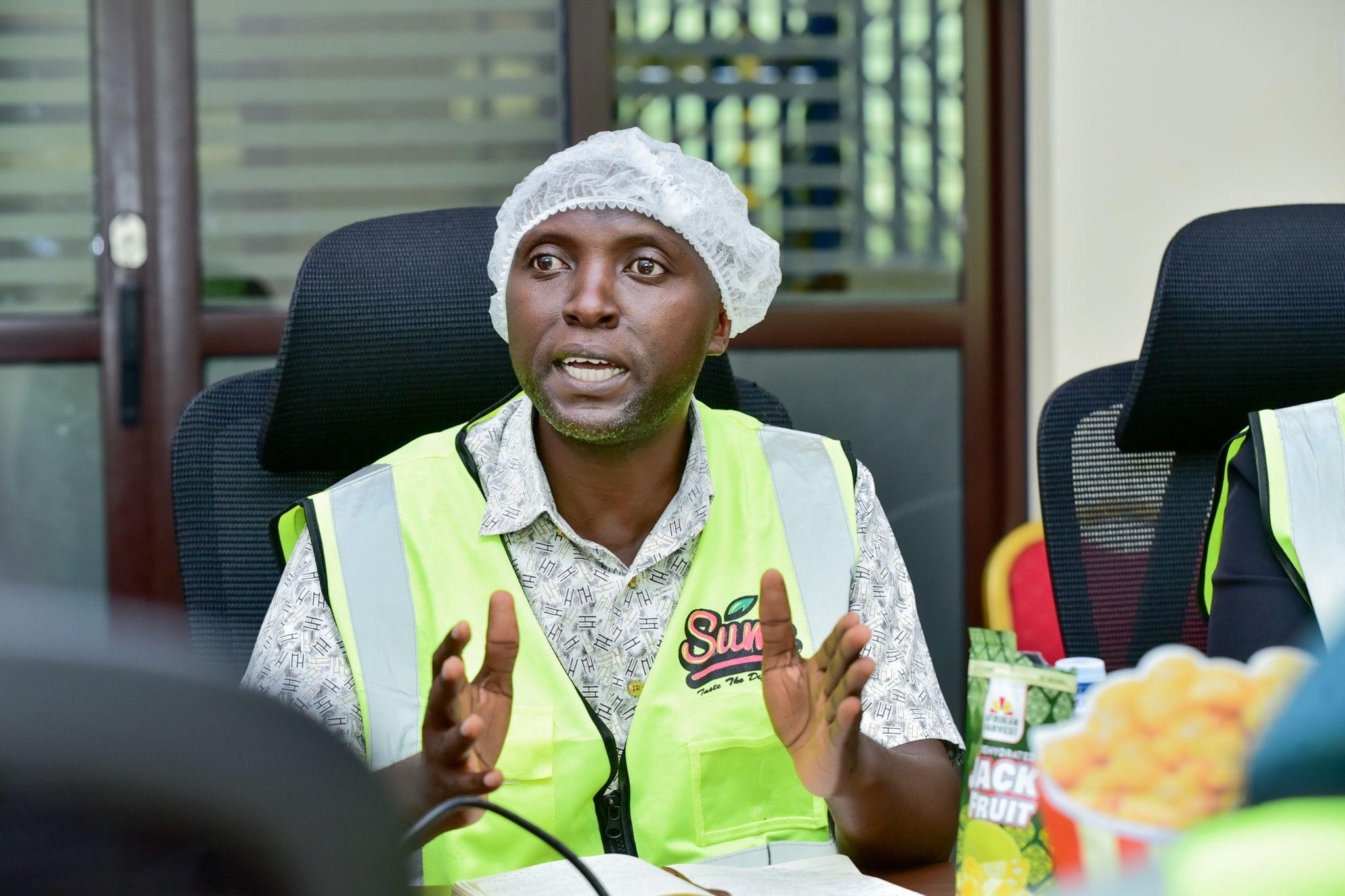
He further suggested specialised courses tailored to the factory’s needs and attachment of research students interested in manufacturing. Such collaboration would contribute to curriculum responsiveness and ensure that graduates are equipped with market-relevant competencies.
Strengthening University–Industry Linkages
The engagement reflects Makerere University’s continued commitment to strengthening partnerships that bridge knowledge generation and real-sector application.
Both institutions expressed a shared vision of building a structured, mutually beneficial collaboration that integrates research, innovation, skills development, and enterprise growth, positioning the University as a key knowledge partner in Uganda’s manufacturing transformation.
Discussions remain ongoing as both parties refine priority areas for formalisation.
Caroline Kainomugisha is the Communications Officer, Advancement Office.
General
Makerere University commemorates 13 transformative years of partnership with Mastercard Foundation
Published
2 days agoon
March 2, 2026
On Friday, 27th February 2026, Makerere University proudly celebrated 13 years of a significant partnership with the Mastercard Foundation, a prestigious independent organisation headquartered in Toronto, Canada. Since its inception in 2013 with the launch of the Scholars Program-currently headed by Prof. Justine Namaalwa, this collaboration has grown significantly, expanding to include two additional initiatives: The E-learning Initiative-headed by Prof. Paul Muyinda Birevu and the Africa Climate Collaborative-headed by Prof. Gorretie Nabanoga. This long-term partnership underscores the shared commitment to fostering education, innovation, and sustainability in Uganda and across Africa.
The colourful event coincided with the 76th Graduation Ceremony, during which Makerere University honoured Ms. Reeta Roy, the Founding President and CEO of the Mastercard Foundation, with an honorary Doctor of Laws.

In her commencement speech, Ms. Roy thanked Makerere University for considering a partnership with the Mastercard Foundation and for conferring upon her a prestigious honorary award.
“Mastercard Foundation is honoured to collaborate with this esteemed university, and I appreciate the recognition through this award. I am excited to be associated with Makerere University and look forward to actively embodying its values. Joining the broader community of alumni from this distinguished institution is a privilege, and I am eager to contribute to its legacy,” stated Ms. Roy.

During the reception in honour of Ms. Roy, the Chairperson of Makerere University Council, Dr. Lorna Magara, acknowledged the invaluable support from the Mastercard Foundation. She emphasised the profound impact of the Foundation’s various initiatives, particularly the scholarships for disadvantaged youth, which enable them to access higher education and opportunities that might have otherwise been beyond their reach.
“On behalf of the Makerere University Council and the broader University community, I extend our sincere gratitude to Mastercard Foundation for its commitment to collaborating with Makerere University in various endeavours, especially for providing scholarships to our underprivileged young people who would never have stepped inside a lecture room at the University.” Dr. Magara stated.

Dr. Magara, in a special way, thanked Ms. Roy for her transformative leadership and unwavering commitment to supporting young people in Africa, citing her efforts to ensure young people get their voices heard.
“As a university, our business is with young people. We are therefore committed to providing the environment and education that deliver meaningful pathways. We will provide an environment that ensures young people have a voice and agency to create meaningful change in society.” Dr. Magara pledged.

Dr. Magara further congratulated Ms. Roy on her honorary Doctor of Laws from Makerere University, noting that it is the university’s highest honour for individuals who have excelled in their careers.
“On behalf of the Makerere University community, I would like to extend my heartfelt congratulations on your honorary Doctor of Laws. This esteemed recognition represents the highest honour our institution can bestow on individuals who have demonstrated exceptional achievement and excellence across various facets of their career.” Dr. Magara remarked.
Prof. Justine Namaalwa, the Program Director of the Mastercard Foundation Scholars Program and the Coordinator for all Mastercard Foundation Initiatives at Makerere University, expressed her appreciation for the thirteen-year collaboration between Makerere University and the Mastercard Foundation. She highlighted that the partnership had yielded significant, impactful results.

“In 2013, Makerere University partnered with the Mastercard Foundation to educate the next generation of transformative African leaders who can positively impact their lives, their communities, and the economies of Africa. The partnership has had a significant impact. I thank the University Management and the Foundation team for this visionary collaboration,” remarked Prof. Namaalwa.
Prof. Namaalwa articulated that the partnership with the Mastercard Foundation is primarily focused on empowering young people as agents of change for transformational leadership in Africa. She presented compelling statistics demonstrating the positive impact of the scholars’ program, highlighting the success of individuals who have completed their education and their subsequent professional experiences after university graduation.

“This partnership focuses on young people, aiming to create positive change in their lives. To date, the Scholars Program has graduated 974 alumni, with 48% securing formal employment, 18% starting their own businesses, 8% participating in internships, and 5% pursuing further education. Overall, 72% of Scholar alumni are actively engaged in employment or entrepreneurship,” Prof. Namaalwa stated.
The colourful event showcased a dynamic array of activities that highlighted the entrepreneurial spirit of Scholars and alumni from the Mastercard Foundation at Makerere University. Attendees enjoyed a mini-exhibition featuring innovative products from these ventures.

A video documentary illustrated the positive impact of the three Mastercard Foundation initiatives. The event also featured inspiring poetry recitations by Scholars and a lively atmosphere of music and dance, creating an engaging and memorable experience for all participants.
The high-level event was attended by senior University officials, led by the Chairperson of Council, Dr. Lorna Magara; the Vice-Chancellor, Prof. Barnabas Nawangwe; the Vice-Chancellor, Academic Affairs, Prof. Sarah Ssali, Deputy, and the Ag. Deputy Vice-Chancellor, Finance and Administration Prof. Winston Tumps Ireeta. Mr Yusuf Kiranda, the University Secretary; and Prof. Buyinza Mukadasi, the Academic Registrar, Chancellor Emeritus-Prof. Ezra Suruma, former Chairperson of the Steering Committee of Mastercard Foundation Scholars Program-Prof. Umar Kakumba, and the Deputy Executive Secretary, RUFORUM, and former Program Coordinator of the Scholars Program at Makerere University-Dr. Florence Nakayiwa, among many other officials graced the function.

The event was also graced by a high-level delegation from the Mastercard Foundation, led by Ms. Reeta Roy, the Founding President of the Foundation, and included the Mastercard Foundation Teams from the Country offices in Kigali, Nairobi, and Kampala; the Program partners; the Mentors, Scholars and alumni; as well as the Program staff of the three Mastercard Foundation Initiatives at Makerere University.
At the end of the event, Makerere University honoured Ms. Reeta Roy with University memorabilia, including a pencil-drawn portrait, a pencil-drawn photo of the Ivory Tower, and other Ugandan crafts. Ms. Roy cut a graduation cake together with the 10 graduates of the 76th graduation ceremony from the Mastercard Foundation Scholars Program.
Bernard Buteera is the Principal Public Relations Officer for the Mastercard Foundation Scholars Program at Makerere University.

It is with great pleasure that I welcome you to this edition of Mak News Magazine, a publication that continues to chronicle Makerere University’s journey as a centre of academic excellence, innovation, and societal transformation.
The stories featured in this issue vividly demonstrate Makerere’s unwavering commitment to addressing national, regional, and global challenges through research, partnerships, and people-centred solutions. They reflect a university that is deeply engaged with society, one that applies knowledge not only to advance scholarship, but also to improve lives.
A recurring theme in this edition is innovation for resilience and inclusion. From the College of Agricultural and Environmental Sciences’ Healthy Soy Initiative combating child malnutrition amid climate change, to the cutting-edge work of CEDAT’s Team Green Minds integrating IoT into agriculture, Makerere continues to harness science and technology to respond to pressing development needs. Equally inspiring is the College of Natural Sciences’ success in securing international funding to scale up fish processing technologies, with a deliberate focus on empowering women and strengthening livelihoods.
This issue also highlights Makerere’s growing role in advancing health and wellbeing. The launch of the Early Intervention Psychiatry Services Clinic at Makerere University Hospital marks an important step in strengthening mental health services, while the Hospital’s transformation from a modest sickbay into a centre of excellence stands as a testament to decades of strategic investment, dedication, and service to the nation.
Our commitment to education access and global engagement is equally evident. Strategic partnerships, such as that between the College of Education and External Studies and the Uganda Vocational and Technical Assessment Board, are expanding pathways to quality education. The establishment of the first-ever United States Studies Centre in the Great Lakes Region positions Makerere as a hub for dialogue, research, and policy engagement on global affairs. We also celebrate our vibrant international community, with graduates drawn from 67 nationalities—affirming Makerere’s status as a truly global university.
This edition further showcases initiatives that ensure long-term institutional sustainability, including the launch of the CoCIS Endowment Fund, infrastructure developments such as the modern hostel at Buyana Farm, and transformative programmes supported by the Mastercard Foundation that continue to empower young people across the continent.
As you read through these pages, I invite you to reflect on the collective effort of our students, staff, alumni, partners, and supporters whose contributions make these achievements possible. Together, we continue to shape Makerere University as a place where knowledge serves humanity.
I wish you an engaging and inspiring read.
Prof. Barnabas Nawangwe
VICE CHANCELLOR
Trending
-

 Humanities & Social Sciences1 week ago
Humanities & Social Sciences1 week agoMeet Najjuka Whitney, The Girl Who Missed Law and Found Her Voice
-

 General1 week ago
General1 week ago76th Graduation Highlights
-

 Agriculture & Environment2 weeks ago
Agriculture & Environment2 weeks agoUganda Martyrs Namugongo Students Turn Organic Waste into Soap in an Innovative School Project on Sustainable Waste Management
-

 Health2 weeks ago
Health2 weeks agoMakerere University School of Public Health Graduates First Cohort of Cost-Effectiveness Analysis Short Course
-

 Agriculture & Environment1 week ago
Agriculture & Environment1 week agoCAES Presents Overall Best Performing Student in the Sciences & a Record 28 PhDs at the 76th Graduation Ceremony
